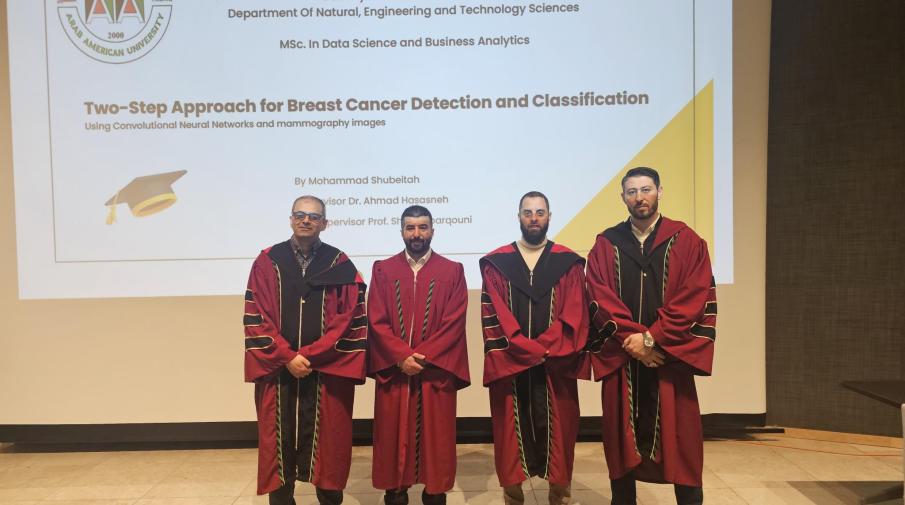Researcher Mohammad Zuhdi Shubaita, a student in the Master’s program in Data Science and Business Analytics, has defended his thesis titled “Two-Steps Approach for Breast Cancer Detection and Classification Using Convolutional Neural Networks and mammography images”.
This thesis presents an integrated two-step learning framework that uses deep learning to simplify and increase the accuracy of the breast cancer diagnosis process. This innovative methodology differs from traditional methods by using raw, unmarked X-ray images, and this would facilitate the pre-treatment phase.
The first step of this framework relies on the U-net advanced model to accurately segment mass abnormalities in mammograms. This step is followed by reprocessing these images by cropping and enlarging these specific blocks to identify and isolate tumor areas so as to begin later the classification process more accurately. This model simulates the approach followed by doctors, focusing computational resources on the most important parts of a mammogram.
The second step includes the use of a carefully modified deep learning model known as (VGG16) that accurately classifies the extracted areas (the areas identified in the first step) into benign or malignant cancer. This step reflects the actual process of the radiologist, and thus provides a tool that is closely aligned with the clinical diagnoses in the medical clinic. This method effectively reduces the computational burden for classifying masses while increasing the accuracy of the diagnostic result by applying the algorithm to the center of the tumor and customizing the system to diagnostic regions and isolating any other regions not involved in classification.
After applying the proposed system to a data set from Augusta Victoria Hospital in Jerusalem - Palestine, the proposed model achieved a block classification accuracy rate of up to 91%. It also demonstrated stability and robustness across an average union crossover score of 70% on a diverse general dataset. These persuasive results not only emphasize the ability of the deep learning model to improve breast cancer detection, but also stress its potentiality to significantly improve diagnostic accuracy.
The thesis was supervised by Dr. Ahmed Hassasneh and Pro. Dr. Shadi Al Barqouni. The committee of examiners included: Dr. Anas Samara and Dr. Mahmoud Obaid.

